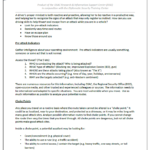
A driver’s proper mindset is both reactive and proactive, allowing her to be reactive in a productive way, and helping her to recognize the signs of an attack that may only register as instinct.
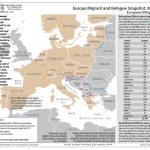
Since 2014, over 1.6 million migrants and asylum seekers have arrived by sea to Europe. European countries registered over 3.18 million new asylum applications. Over 700,000 applicants were granted a form of protective status, mostly in Germany, France, Sweden, Italy, and the Netherlands, with 450,000 applicants rejected in the same time period, and over 1.1 million pending applications at the end of 2016. Amendments to the Schengen Border Code, proposed in response to terrorist threats, aim to strengthen external borders by requiring systematic database checks at entry and exit.
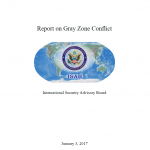
The study addresses the challenges facing the United States from the increasing use by rivals and adversaries – state and non-state alike – of what have come to be called “Gray Zone” techniques. The term Gray Zone (“GZ”) denotes the use of techniques to achieve a nation’s goals and frustrate those of its rivals by employing instruments of power – often asymmetric and ambiguous in character – that are not direct use of acknowledged regular military forces.
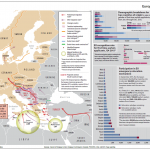
Asylum seekers and other migrants are arriving in Europe and encountering rapidly changing border controls as they seek transit through Europe. The EU is implementing its “hotspot” approach for new arrival registration in Italy and Greece. This is a snapshot of the situation based on available unclassified data as of March 4, 2016.
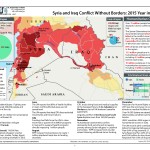
Over 15 million people have been displaced due to conflict in Syria and Iraq. The Syrian Observatory for Human Rights documented at least 260,000 Syrians killed in the conflict since it began in 2011. The UN reported at least 26,600 Iraqis killed from 2014-2015 due to acts of terrorism and violence.
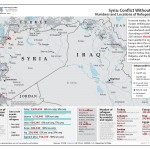
In recent weeks, the upsurge of Syrians seeking asylum in European countries has overwhelmed existing capacity. According to UNHCR, as of July 2015 almost 350,000 Syrians have applied for asylum in Europe since the conflict in Syria began, nearly half applying in Germany and Sweden and one third in Serbia, Hungary, Austria, Bulgaria, and the Netherlands combined.

Public Intelligence has obtained the most recent version of the U.S. Civil-Military Strategic Framework for Afghanistan, the second revision of the document dated August 2013, detailing the U.S. government’s goals and priorities for rebuilding Afghan society. Issued by the U.S. Ambassador to Afghanistan James Cunningham and signed by the commander of U.S. forces Joseph Dunford, the framework covers U.S. priorities related to governance, the rule of law, socioeconomic development as well as the gradual transfer of authority to the Afghan government. When compared with a previous version of the framework from March 2012, also obtained by Public Intelligence, the document solidifies the prospect of long-term U.S. involvement in Afghanistan, removing optimistic statements about turnover dates and self-sustaining funding estimates and replacing them with measured assessments reinforcing the notion that U.S. and international forces will be present in Afghanistan far into the next decade.
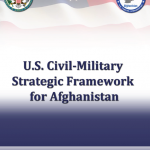
The U.S. Civil-Military Strategic Framework for Afghanistan outlines U.S. priorities through the Transformation Decade (2015-2024). It is meant to be adaptive, giving decision makers in Kabul and Washington, and policy implementers throughout Afghanistan, the flexibility needed to respond to changing conditions while advancing a set of commonly stated strategic goals and priorities.
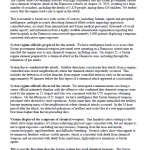
The United States Government assesses with high confidence that the Syrian government carried out a chemical weapons attack in the Damascus suburbs on August 21, 2013, resulting in a large number of casualties, including the deaths of 1,429 people, among them 426 children. We further assess that the regime used a nerve agent in the attack.
An overview presentation on the U.S. Department of State Operations Center from September 24, 2012.
The group or individuals responsible for the attack on the Benghazi consulate remains unknown. It is also unclear if the attack was premeditated or simply a demonstration that spun out of control. Following the overthrow of Muammar Qaddafi and the ensuing civil war, Libya has been awash with small arms and light weapons. The use of such arms at the demonstration does not necessarily indicate a pre-meditated, coordinated attack. Online jihadi groups have claimed the attack was due to a statement released by al-Qa’ida leader Ayman al-Zawahiri regarding the earlier death of another al-Qa’ida leader, Abu Yahya al-Libi. Others have suggested that the attack was pre-meditated to coincide with the 9/11 anniversary in the United States. Neither of those claims has been substantiated. Until more evidence comes out, OSAC is unable to conclude whether this was a pre-meditated, planned, and coordinated assault on the Consulate.
U.S. Department of State Humanitarian Information Unit map from July 19, 2012 depicting locations and numbers of internally and externally displaced persons as a result of the current conflict in Syria.
Last May, we wrote an unusual piece that went largely unnoticed about how a staggering phenomenon had begun to develop of people sending us mail for Henry Kissinger. Through some sort of confused “identity confusion” many people stumbled across a page on our site containing an unflattering profile of Henry Kissinger and his company’s past activities, including connections to money laundering, weapons trading banks. For some reason, this single posting on the site convinced a large number of people that we were Henry Kissinger and/or his firm Kissinger Associates. So, we wrote an elaborate and slightly comical article about how much mail we receive for Mr. Kissinger and a number of other entities. We detailed how we receive search warrants for criminal proceedings because we’ve published a number of lawful access guides for telecom companies, how we receive NSA purchase orders because we have a single page about the Maryland Procurement Office, and how we received an invitation to a White House event that was intended for Mr. Kissinger. We concluded the article with some useful commentary about the implications of such rampant misidentification even at seemingly high levels of government and business. We even added a large, bold warning at the top of the page about Kissinger Associates to make it emphatically clear that we are not Henry Kissinger.
An overview of a U.S. State Department survey of Afghan women titled “Exploring Women’s Roles in Afghanistan” from October 2010.
The Criminal Justice Sector Assessment Rating Tool (CJSART) is designed to assist policy makers and program managers to prioritize and administer host-nation criminal justice sectors needing assistance. Once the assistance programs are underway, the CJSART is a systematic tool designed to measure progress and accomplishments against standardized benchmarks. Used in its entirety, the CJSART holistically examines a country’s laws, judicial institutions, law enforcement organizations, border security, and corrections systems as well as a country’s adherence to international rule of law standards such as bilateral and multilateral treaties.
Every year, U.S. officials from agencies with anti-money laundering responsibilities meet to assess the money laundering situations in 200 jurisdictions. The review includes an assessment of the significance of financial transactions in the country‘s financial institutions involving proceeds of serious crime, steps taken or not taken to address financial crime and money laundering, each jurisdiction‘s vulnerability to money laundering, the conformance of its laws and policies to international standards, the effectiveness with which the government has acted, and the government‘s political will to take needed actions.
Consular Affairs has developed a highly penetrative security ink to be used exclusively for cancelling nonimmigrant visas. This unique formulation, designated security ink #297, is specially designed to penetrate TESLIN, the synthetic material used as the basis of visa foils issued since late 1993 until the recent introduction of the Lincoln Visa. The ink finally selected was chosen after extensive laboratory testing undertaken by both the U.S. Secret Service and INS/FDL. Up to now, there existed no genuinely effective means for cancelling a visa permanently short of destructive methods that risked damaging the underlying passport page. To remedy this, CA commissioned the manufacture of two types of visa cancellation stamps in conjunction with the new security ink, and they are being distributed to visa issuing posts worldwide.
The recent social unrest and subsequent government overthrows in Egypt and Tunisia have had deep reverberations not only around the Middle East, but throughout the world. While speculation proliferates about which country will be the next to experience such tumult, a critical analysis of important variables present in both countries should be applied to any other country when making this assessment. In this report, those variables will be analyzed with respect to the People’s Republic of China, and the probability it will be the next country to experience social unrest.
Two U.S. State Department OSAC Reports on the Caucasus Emirate from August and September 2010.